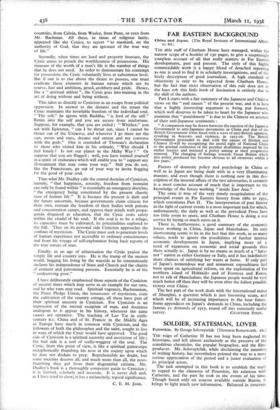FAR EASTERN BACKGROUND
THE able staff of Chatham House have managed, within the narrow scope of a booklet of x3o pages, to give a surprisingly complete account of all that really matters in Far Eastern developments, past and present. The style of this highly commendable work is a happy blend of detached reporting as one is used to find it in scholarly investigations, and of the lively description of good journalism. A high standard of objectivity is only to be expected from Chatham House, but the fact that strict observation of this rule does not in the least rob this little book of fascination is entirely due to the skill of the authors.
Part I starts with a fair summary of the Japanese and Chinese
views on the " real causes " of the present war, and it is here that a highly interesting argument is being put forward, which well deserves to be taken to heart by the Japanese who maintain that " punishment " is due to the Chinese on account of their anti-Japanese sentiments : " A comparison may be drawn between the reaction of the Japanese Government to anti-Japanese movements in China and that of the British Government when faced with a wave of anti-British agitation, resulting in boycotts and violence, in 1925-26. The British Government proceeded to deal with the causes of friction and Chinese ill-will by recognising the moral right of National China to the gradual extinction of the peculiar disabilities imposed by the earlier treaties and initiated a policy aiming at their progressive removal. The changing of feelings towards Great Britain which this policy produced has become obvious to all observers within a few years."
Factors of domestic policy and psychology in China as well as in Japan are being dealt with in a very illuminating manner, and even though there is nothing new in this des- cription of the internal affairs of the two adversaries, it certainly is a most concise account of much that is important to the knowledge of the forces working " inside East Asia:" The same is true of the very timely recapitulation of the principal events in Far Eastern history from 186o to 1931, which constitutes Part II. The interpretation of past history in the light of current events is a most important task for which, unfortunately, the daily as well as the periodical Press have too little room to spare, and Chatham House is doing a real service by laying so much stress on it.
There is, furthermore, a good summary of the economic forces working in China, Japan and Manchukuo. Its only shortcoming seems to be in the fact that this work, as so many others, tends to ignore the possibilities of further internal economic developments in Japan, implying more of a
need of expansion on economic and social grounds than there actually is. Japan is by no means as much of a " have- not " nation as either Germany or Italy, and it has indefinitely more chances of satisfying her wants at home. If only part of Japan's tremendous war and armament expenditures had been spent on agricultural reform, on the exploitation of the northern island of Hokkaido and of Formosa and Korea, not to talk of Manchukuo, the Japanese people would be very much better off than they will be even after the fullest possible victory over China.
The last part of the work deals with the international status of Shanghai, a question which is just becoming acute, and which will be of increasing importance in the hear future. Some appendices on Japan's demands in China, including the famous 21 demands of 1915, round off this extremely useful










































 Previous page
Previous page